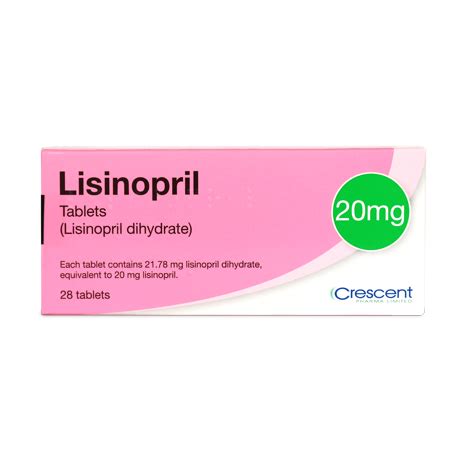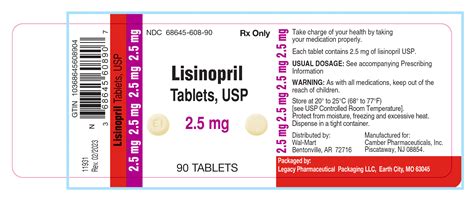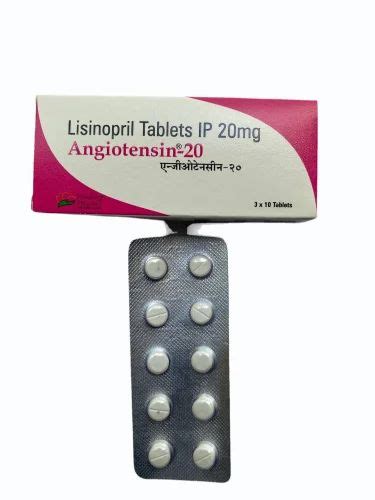Intro
Lisinopril 20mg tablets treat hypertension, heart failure, and protect kidneys. Uses include lowering blood pressure, reducing stroke risk, and managing cardiac conditions, with benefits like improved cardiovascular health and decreased mortality rates.
Lisinopril 20mg tablets are a type of medication that belongs to the class of drugs known as angiotensin-converting enzyme (ACE) inhibitors. These medications are primarily used to treat high blood pressure and heart failure. The importance of managing these conditions cannot be overstated, as they are leading causes of morbidity and mortality worldwide. High blood pressure, if left untreated, can lead to serious complications such as heart attack, stroke, and kidney disease. Therefore, understanding the role of lisinopril 20mg tablets in treating these conditions is crucial for patients and healthcare providers alike.
The mechanism of action of lisinopril involves blocking the conversion of angiotensin I to angiotensin II, a potent vasoconstrictor. By inhibiting this conversion, lisinopril causes blood vessels to relax and widen, which lowers blood pressure and increases the supply of blood and oxygen to the heart. This action also reduces the workload on the heart, making it easier for the heart to pump blood efficiently. As a result, lisinopril 20mg tablets are not only effective in lowering blood pressure but also in reducing the risk of heart failure and other cardiovascular diseases.
The use of lisinopril 20mg tablets has been extensively studied, and the results have consistently shown that this medication is effective and safe when used as directed. Patients who take lisinopril 20mg tablets as prescribed by their healthcare provider can expect to see significant improvements in their blood pressure and overall cardiovascular health. Moreover, lisinopril 20mg tablets are often prescribed in combination with other medications to treat conditions such as diabetic nephropathy, a type of kidney disease that occurs in people with diabetes. The versatility of lisinopril 20mg tablets in treating various cardiovascular and kidney diseases makes them a valuable addition to the arsenal of medications available to healthcare providers.
How Lisinopril 20mg Tablets Work

Benefits of Lisinopril 20mg Tablets
The benefits of lisinopril 20mg tablets are numerous and well-documented. Some of the most significant benefits include: * Lowering blood pressure: Lisinopril 20mg tablets are effective in reducing systolic and diastolic blood pressure in patients with hypertension. * Reducing the risk of heart failure: By decreasing the workload on the heart, lisinopril 20mg tablets can reduce the risk of heart failure and other cardiovascular diseases. * Improving kidney function: Lisinopril 20mg tablets have been shown to slow the progression of kidney disease in patients with diabetic nephropathy. * Reducing the risk of stroke and heart attack: By lowering blood pressure and reducing the workload on the heart, lisinopril 20mg tablets can reduce the risk of stroke and heart attack.Side Effects of Lisinopril 20mg Tablets

Precautions and Warnings
Patients who are taking lisinopril 20mg tablets should be aware of the following precautions and warnings: * Pregnancy and breastfeeding: Lisinopril 20mg tablets are contraindicated in pregnancy and breastfeeding, as they can cause harm to the fetus or baby. * Kidney disease: Patients with kidney disease should use lisinopril 20mg tablets with caution, as they can worsen kidney function. * Liver disease: Patients with liver disease should use lisinopril 20mg tablets with caution, as they can worsen liver function. * Allergic reactions: Patients who are allergic to lisinopril or other ACE inhibitors should not take lisinopril 20mg tablets.Dosage and Administration

Interactions with Other Medications
Lisinopril 20mg tablets can interact with other medications, including: * Diuretics: Patients who are taking diuretics should use lisinopril 20mg tablets with caution, as they can increase the risk of hypotension. * Potassium supplements: Patients who are taking potassium supplements should use lisinopril 20mg tablets with caution, as they can increase the risk of hyperkalemia. * Nonsteroidal anti-inflammatory drugs (NSAIDs): Patients who are taking NSAIDs should use lisinopril 20mg tablets with caution, as they can reduce the effectiveness of the medication.Conclusion and Final Thoughts

We invite you to share your thoughts and experiences with lisinopril 20mg tablets in the comments below. Have you taken lisinopril 20mg tablets for hypertension or heart failure? What were your experiences with the medication? Do you have any questions or concerns about lisinopril 20mg tablets? We encourage you to share your thoughts and engage with our community.
What is the primary use of lisinopril 20mg tablets?
+Lisinopril 20mg tablets are primarily used to treat hypertension and heart failure.
How do lisinopril 20mg tablets work?
+Lisinopril 20mg tablets work by inhibiting the angiotensin-converting enzyme (ACE), which leads to a decrease in blood pressure and an improvement in cardiovascular health.
What are the common side effects of lisinopril 20mg tablets?
+The common side effects of lisinopril 20mg tablets include cough, dizziness, fatigue, headache, and nausea and vomiting.
